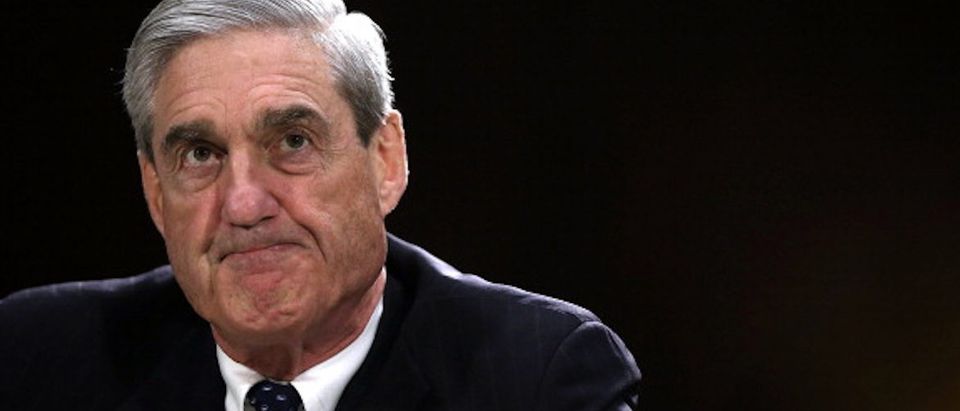After 10 months of leading the FBI’s Trump-Russia investigation, counterintelligence official Peter Strzok had not seen compelling evidence that President Trump or high-level campaign officials colluded with the Russian government, according to a person familiar with his thinking.
That account comports with a May 19, 2017 text exchange between Strzok and FBI lawyer Lisa Page that was released earlier this week.
“You and I both know the odds are nothing. If I thought it was likely, I’d be there no question. I hesitate in part because of my gut sense and concern that there’s no big there there,” Strzok wrote to Page, his mistress.
WATCH: Timeline Of The Mueller Investigation:
Wisconsin Sen. Ron Johnson, the chairman of the Senate Homeland Security Committee, disclosed the “jaw-dropping” text earlier this week. He said that the message suggested that the FBI investigators had seen no evidence of collusion between the Trump campaign and Russian government. (RELATED: In ‘Jaw-Dropping’ Text Message, Strzok Expressed ‘Concern’ Over Mueller Probe)
It was unclear exactly what Strzok meant by the message, but the source close to Strzok affirmed that interpretation of the exchange to The Daily Caller.
The source spoke on the condition of anonymity because of the sensitivity of the issue.
In the exchange with Page, Strzok was weighing whether to put in for a promotion at the FBI’s Washington Field Office or to go to work for Robert Mueller, the former FBI director who had been appointed special counsel two days before the text exchange.
If anyone had seen evidence of collusion by that point, it would have been Strzok. As deputy director for counterintelligence, he was picked to oversee the Russia investigation in July 2016, shortly after the release of the Democratic National Committee’s hacked emails.
One of Strzok’s tasks in the investigation was to conduct the Jan. 24, 2017, White House interview with then-national security adviser Michael Flynn. Flynn, a retired lieutenant general, has since pleaded guilty to lying to the FBI during that interview about his contacts with Russia’s ambassador, Sergey Kislyak.
Strzok believed early on in the investigation that Russia was behind the hack and release of Democrats’ emails. But he saw no compelling evidence that Trump, his family, or top officials in the campaign were involved in the email hacks, the source close to Strzok told TheDC.
As of May 2017, Strzok had not been persuaded that the investigation would be a major case, as it has been portrayed in the press. According to the source close to Strzok, he did not see evidence that the upper echelons of Trumpworld had committed a crime.
Additional information has emerged since Strzok’s text message, and it is not clear if it changed the investigator’s thinking about collusion.
In July, The New York Times reported on a previously-undisclosed June 2016 meeting at Trump Tower between Donald Trump Jr. and a group of Russians with some connections to the Kremlin.
Trump Jr. accepted that meeting after an acquaintance emailed him offering dirt on Hillary Clinton. The real estate executive was told that a Russian government attorney would provide the information, and he readily accepted the offer.
But Trump Jr. and the Russian attendees have denied that any information exchanged hands or that there was any follow-up to the meeting. It has been reported that Mueller’s team was not aware of the meeting until it was reported by the press.
Strzok would not have had much time to dig into that part of the investigation. That’s because he was removed from the Mueller team on July 27, after the Justice Department’s inspector general informed Mueller of Strzok and Page’s text messages.
The texts — 384 pages of which have been provided to Congress — show that the two officials were heavily critical of Trump during his ascent to the Republican nomination for president.
Strzok referred to Trump as an “idiot” in one exchange, and said “F Trump” in another.
In one cryptic text message, Strzok suggested that the FBI needed to take out an “insurance policy” of some sort in case Trump won the election. (RELATED: FBI Officials Discussed ‘Insurance Policy’ In Case Of Trump Win)
“I want to believe the path you threw out for consideration in [Deputy Director Andrew McCabe’s] office — that there’s no way [Trump] gets elected — but I’m afraid we can’t take that risk,” Strzok wrote to Page on Aug. 15, 2016, several weeks after the start of the Russia investigation.
“It’s like an insurance policy in the unlikely event you die before you’re 40.”
Though conservatives have highlighted that text message as evidence that Strzok was gunning for Trump, the source close to Strzok says that the May 19 text message shows that he was not a hyper-partisan opponent of Trump or in the tank for Clinton.
The Mueller investigation appears to be centered now on whether Trump obstructed justice in the firing of James Comey as FBI director. That decision, made on May 9, paved the way for Mueller’s appointment as special counsel.
According to recent reports, Mueller’s team has submitted questions to Trump’s lawyers which indicate that obstruction will be the focus of any questions that the president is asked in an interview. Another issue that could come up is Trump’s attempt to fire Mueller last June. The New York Times reported on Thursday that Trump ordered White House general counsel Don McGahn to fire Mueller. But McGahn threatened to resign instead, and Trump reportedly backed down.


